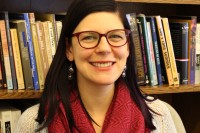Let the afterlife mystery be
In the days after my grandmother died, my aunts introduced me to Iris DeMent's song “Let the Mystery Be”:
As is true for many people, from the early years of Christian faith, the loss of one dear to me sparked wonderings about what happens after death. I have fuzzy, 15-year-old memories of one of my aunts thinking aloud about the possibility of reincarnation, and older family members assuring us all that my grandmother was sitting at the feet of Jesus.
Years later I am willing to claim some beliefs about life after death, but I still find wisdom in DeMent’s words: “I believe in love, and I live my life accordingly. But I choose to let the mystery be.”
The song’s lyrics go through a number of beliefs about the afterlife, including a somewhat surprising mention of purgatory:
Some say they’re going to a place called glory,
And I ain’t saying it ain’t a fact.
But I’ve heard that I’m on the road to purgatory,
And I don’t like the sound of that.
In this song, DeMent's original lyrics express the wonderings of others as well. She has also recorded some of the gospel standards she knows from childhood. Here's a beautiful rendition of “Will the Circle Be Unbroken” with DeMent and several others:
Like "Farther Along"—another gospel song with which I was raised—"Will the Circle Be Unbroken" gives voice to raw grief and unanswered questions about life and death, while at the same time offering reassurances of faith. We need not try to deny the pain of separation from our loved ones. The difficult questions can exist in tension with Christian hope. We can sing along with “Will the Circle” that we hate to see a loved one go and yet trust in a home with God awaiting that person. And we need not have all of the answers about what that hope looks like in order to cling to it.
At the first hospital where I worked as a chaplain, we had a written prayer for times when we were with a family after miscarriage or stillbirth, or when a child was not expected to survive for more than a few hours. We kept it in a kit along with holy water and the certificates of blessing and baptism. The prayer included the line, “Oh God, we stand before you in the mystery of life and death.” The more deaths I attend—whether a child who doesn’t survive birth, an adult nearing 100, or anyone in between—the more the truth of this line resonates with me. In life and death, we stand in mystery.
Whichever of the biblical and traditional views of the afterlife turn out to be closest to the truth, whether or not there’s a purgatory, and even if almost all of us are headed there, in addition to mystery there is God’s love. And we can live our lives accordingly.






